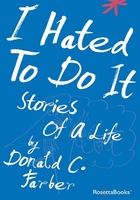A MY ARRIVED at work the following week eager to learn more, as the head trainer, Clint, would be speaking to the trainees again. She spent the morning learning from Jody about the very important matter of the whales' diet.
As they went about distributing the buckets of fish, Amy said, "I imagine the water temperature is pretty much the same as the ocean would be."
Jody smiled. "Fifty-two degrees," she said. "When you get in there, even with a wetsuit, you know it!"
By the time noon rolled around, Amy was glad to sit down with the other trainees for an order-out lunch. As they ate, Clint came out.
"One thing we're kind of nuts about here at the park," Clint said, "is the importance of feedback. Most human beings don't go out of their way to provide feedback. When was the last time someone said to you, 'Hey, I notice you're doing something that way. Have you ever tried doing it this way?' On most jobs, people are left pretty much alone when they do things right. The only time they hear about their performance is at some annual or semiannual review. Meanwhile, if they get any feedback at all it's what we call a gotcha response-somebody caught them doing something wrong.
"Here, it's just the opposite. Feedback is going on all the time, between people and animals, and between people and people-and it's all constructive. The feedback you get here is not to catch you doing things wrong but to catch you doing things right. It's designed to help you improve and be a successful trainer. And when there is an error or failure, the feedback will simply redirect your behavior into the right channel."
With that, Clint introduced each of the trainers sitting in the back. "This is Jared, that's Kim Lee, and she's Brenda. These folks are experienced trainers. One of them will be assigned to each of you as your coach. This person will stay with you and oversee your progress, making sure your learning and adjusting to stay on track. After a while, we'll switch off so you can be exposed to a variety of viewpoints and experience."
As Amy watched the smiling trainers in their black wetsuits, looking so capable and professional, she knew she would be happy to be assigned to any one of them. After all, some of these were the people she'd watched in shows from her seat in the audience, the ones who had been her idols for a decade.
As the coaches walked out with their assigned trainees, Amy found herself with Kim Lee, who smiled at her in reassurance. She noted that Steve was assigned to Jared and Brenda was to be Lorraine's coach. The pairs split up and moved around the pool area, the coaches pointing out things to their charges.
As Kim Lee and Amy made their way to a far pool, the coach made a hand signal, and one of the enormous killer whales swam immediately over to their side of the pool. Amy marveled at the animal's response.
"Meet my friend Tutan," Kim Lee said, kneeling down to stroke the whale's head and crooning at it just as if it were her own baby. Her loving admiration of the animal was evident. "Say hello to Amy, Tutan," she said, and Tutan lifted his huge head and nodded toward Amy, as if it were a handshake.
As they walked around the pool, Amy said, "I noticed the hand movement you used to cue Tutan to nod to me. It worked like clockwork. How long does it take to train each whale to do a trick like that?"
Kim Lee turned to her, smiling. "You were sharp to observe that. You'll want to keep using those good observation skills when working with the animals here. But let me redirect one thing you said. You called what I did a trick. When people see a killer whale perform one of these actions, they call it a trick, but I want you to be clear we're not tricking people or animals here. We're looking at specific behaviors we want to reward."
Amy reflected that she was being introduced to a kind of thinking and perceiving that was at once foreign and familiar; simple and profound. When these things had been presented in her graduate psychology classes, she'd wondered what they had to do with the real world. Here at Sea-World they were coming to life as practical strategies.
Kim Lee said, "It does take a long time to train a whale to nod like that, but most of that time is spent developing trust. Along the way failures are ignored, while each step toward success is rewarded and reinforced. Again, this is just good science." She paused a moment, then said, "In the long run, two things keep you going in this work: patience and persistence. You have to practice patience again and again, not rushing things or allowing yourself to get the slightest bit upset. And when patience is in short supply, that's when persistence kicks in."
In one of the theory sessions that afternoon, Clint Jordan introduced a new concept by writing the following on a whiteboard:
A = Activator
B = Behavior
C = Consequence
Clint explained, "This is a way of thinking about the plan we use to shape the animals' behavior. A stands for activator; that's whatever we do to set up the desired behavior to happen. B stands for the behavior we want. And C stands for consequence-what happens afterward. Which of these steps do you think is the most important?"
Steve said, "I would think it's A, because you've got to set up the animal for success and cue it with the hand signal."
"Good," Clint said. "That's definitely important, but not as important as another step."
"Gotta be B, behavior," Lorraine burst out confidently. "After all, that's what you're trying to produce."
"Sure," Clint said. "Still not the most important."
Everyone looked at Amy as if it was her turn. "Uh, C for consequence?" she said sheepishly.
"How'd you figure that out?" Clint deadpanned, and everyone laughed. "But now, why is that so? When so much time goes into training the behavior to happen, why is what you do after it happens the important piece?"
"Because that's the reward," Amy said, "which the animal comes to associate with doing the behavior, and therefore it's motivated to do it. The positive consequence is what drives and maintains the behavior."
"Exactly right," said Clint. "When you apply this to people at work, you find it's not so much in evidence. When they do what they're supposed to do, nobody notices. Often it's only when they mess up that a lot of fuss is made about it. Meanwhile, they're expected to carry on and do well without feedback. Have you found this to be true?"
Heads nodded, and several examples were given. Amy thought back to several jobs she'd had, where this pattern had been played out.
"No wonder people aren't motivated to go beyond what's expected in their work," said Steve. "No one seems to care."
"That's why we pay so little attention around here to what animals and people do in correctly," Clint said, "and so much attention to what they do right. I'm of the opinion that if all you did in dealing with family, friends, and even casual acquaintances was to notice and comment on what they did right, you'd find yourself among some very happy people. And you'd be pretty happy yourself, because of the way they treated you back."
As she pondered the A-B-C principle throughout the morning, Amy found herself thinking about Lorraine, her fellow trainee. From the beginning it seemed to Amy that Lorraine didn't like her, but she didn't know why. With that sour expression, Amy told herself, she probably doesn't get along with anybody in her life.
Listening to Clint's point about ignoring the negative and emphasizing the positive, Amy looked at her own tendency to judge Lorraine. She and I are probably going to be working together here for a long time, she thought. It can't hurt to try this principle on her. I'm going to go out of my way to be nice to her. If she puts others off like she has me, she probably doesn't get that kind of response often. She decided to look for something Lorraine did well and call attention to it.
At lunchtime she had her chance. Lorraine usually avoided sitting across the picnic table from Amy, but today that was the only seat not taken. After the usual lively discussion over sandwiches and soft drinks, the others drifted away. Because Lorraine's order had arrived late, she remained to finish her lunch, continuing to avoid eye contact.
"I've been meaning to tell you," Amy said, "some of your questions and comments have been really helpful to me."
Lorraine looked up suspiciously. "Really?" she said with a frown.
"Really. Your question today about the nutritional ingredients in the fish we feed the whales opened up that whole discussion about calories, and then the points about environmental changes in the oceans came out. I was fascinated. I'm one of those people who always reads food labels, but I just hadn't thought about it with regard to the whales."
Lorraine looked away and said, "That's interesting."
"Where did you learn that stuff, anyway?" Amy persisted. She found herself not only determined to meet the challenge of Lorraine's attitude but genuinely interested in the woman.
"I was a chem major in college and worked a couple of years in a hospital dietary lab."
"So was that part of the path that led you here?"
Lorraine sighed. But she evidently decided that Amy was not to be dismissed. She turned to Amy and went on with her story.
As Amy nodded and smiled and asked questions, she observed that Lorraine was starting to lose some of her reserve. Soon the call came to assemble for an animal training observation. As they rose and walked away together, Lorraine said dutifully, "Sometime you must tell me about your background."
Amy thought, She's a tough cookie. Maybe she never had a mother that listened to her. But that wasn't so hard. I'll keep trying, if only to prove to myself that this A-B-C stuff works, whether on animals or humans.
Whale Done Notes
USING THE METHOD WITH PEERS
Set things up for success
Whale Done techniques work with people of all ages. That's because all of us are motivated by attention, approval, and acceptance. As shown in the book Whale Done!, positive responses are particularly powerful in workplace relationships, where interactions are supposedly based on rational, nonemotional thinking and behavior. People's inability to get along and communicate well are commonly cited as causes of nonproductivity and low morale. Managers who treat their people in a Whale Done way are helping build the trust, cooperation, and commitment of their people. Looking for and acknowledging what is good and acceptable in workmates' behaviors helps create a positive team environment. Mutual ignoring of faults and rewarding of right behavior can also be the basis of a strong marriage.
Ignore failure and/or redirect
Whenever you observe a behavior that is unacceptable to you, consider whether ignoring it rather than calling attention to it will enhance the relationship. When this is plainly not going to work, take the burden of blame on yourself ("Maybe I didn't make it clear what I meant; let's go over this again"). Explain what good performance looks like. Look for an outcome that can include a Whale Done for the person. When someone is upset, don't attempt to communicate logically. Retire from the scene until emotions have cooled. Later, if it makes sense, bring up the matter calmly and invite the other person's solutions. When emphasizing an idea or soliciting a particular response from another, be sure to include "what's in it for them."
Give a Whale Done!
In parenting, teaching, coaching, or managing, the most common response to good performance is no response: "She's just doing her job." "That's what they get paid for." It's easy to call attention to mistakes and errors-and much harder to notice what people do well. One Whale Done response-calling attention to right behavior-can go far toward establishing trust and a desire to do well. Perhaps this is because it is so unusual to receive a praising or a pat on the back. More likely, it's because all of us really want to do well, hunger for attention, and are motivated to do better by recognition of our best.















